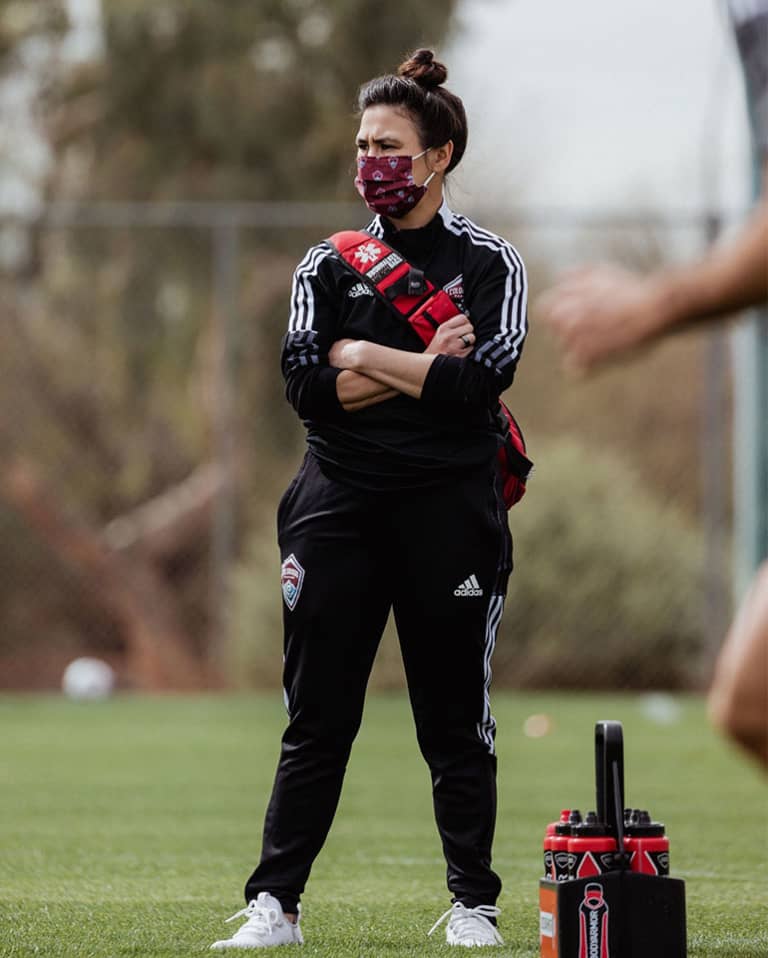Why is it important to talk about mental health?
There are so many skills we need to obtain to be able to recognize when we need help and be in a place to actually make a difference before we’re too far gone. I think we need to know how to respond to people even if they aren’t our really close friends. You might not have the closest relationship or feel that you are close enough in people’s life to be a person expressing your true feelings, but letting them know that you can listen and offer your experiences and help them navigate through dealing with their mental health journey is a major start, even if those feelings are not suicide or deep dark depression. Life is still stressful.
How does mental health weave itself into your job as an athletic trainer?
With the realm I work in, we are always on the go. We have early mornings and late nights and lots of travel and that alone is a stressor. Sometimes these are good stresses and sometimes these are hard to manage and figure out how to navigate. I have to ask myself how to navigate this schedule and keep my family and friends linked in and how I can manage my sleep schedule. We talk about sleep hygiene all the time in my profession. Not having enough sleep because you are traveling and always on a flight, that affects your mood and how you navigate your work. I have to continuously ask myself if my body is ready and recovered to work. All of these things can be incorporated into how I deal with my day-to-day life as an athletic trainer.
What is the biggest challenge in maintaining your mental health on a day-to-day basis?
It really is a day-to-day challenge. I definitely have gotten to the point where it is very expensive. It is hard to find accessible, affordable tools. We are seeing a lot more virtual options where you don’t have to be in person. For me, I don’t know what I prefer. When you go through the questionnaires that say, “Well, what is it that you are dealing with? Is it depression? Is it anxiety? Is it self image?”. I am always like, “I don’t know. All of it.”. Sometimes I feel like I need somebody to tell me. I think that can be the most exhausting, scary portion of finally getting into mental health support. We also have to think about the intersectionality of finding support that we are comfortable with. Are we looking for a person of color? Do you want somebody who is LGBTQ friendly? Do you want somebody that is culturally knowledgeable about religion or where you are from? As humans, we don’t always want to explain the ways we are feeling and why we feel that way. As a human, I am still trying to navigate that, and I am working to find a person that fits for me to keep working on my personal mental health.

How do you provide support to players from different backgrounds in your profession?
I feel very fortunate to have my own experiences of working abroad. I was working in China for four years right before the pandemic and right before I started this position. I have that understanding of not being able to communicate the way you want. Some things just don’t translate the way you intend them to. However, just being present, and trying to understand and being patient makes so much of a difference for these players. They are all trying to navigate how to make their new home feel like a home. I often have conversations with them about finding places in Denver that can give them a piece of home. We talk about the local international markets where they can find food that reminds them of home. It is so surprising how food and sharing meals with people can do so much for your mental health. It’s funny because we sometimes think of our cliques as a bad thing, but you are starting to see how diverse our team is and how that often helps players integrate into a new environment. You have our French and French-Canadian players who have found their group and they can talk about experiences they share. You have our Latin American crew, you have our African crew. It is so important for them to have somebody to talk to and share their experiences with.
How do you support players who are in the process of recovery from an injury?
A lot of times it can be dependent on whether they are seen as a leader on the team and they feel that they have to push more or show their face more. In those cases, I try to be extra supportive and let them know that they need to take care of themselves before they can take care of other people. These players need to be in a good position before they can provide for others. If they don’t set that example, then how is the rest of the team going to be able to take care of themselves and see rest as active rest and not just laziness? I think for the previous generations, the stigma has always been laziness. We hear the term ‘man up’ and now we have brought in a culture of listening to your body and being smarter about the periodization plans. We also see the other side, which is long-term injuries. Some players have done such a fantastic job throughout their careers that they now identify solely as athletes. When that gets taken away, the way that they are able to process emotions and their anger and anxiety changes. We try to help them find other outlets and other goals to work towards. We talk a lot about goal setting and visualization. Sometimes we even see guys undergoing virtual reality recovery, which is cool because it gives them a sense of being back in it. We are just lucky to have different outlets and options to keep them interacting with the team and not just sat in a corner. We want to get them involved with the support system as much as possible.
How do you keep your mental health in check so you can maintain mental sharpness as an athletic trainer?
It can be draining. It is really about making sure that I am living a healthy lifestyle and practicing what I preach, making sure that I am fit physically and mentally. Am I too hopped up on caffeine because I have had too many cups of coffee? That is something that I have to pay attention to. I don’t need to be all shaky and anxious on the sidelines. I need to identify what are triggers for me and what keeps me calm and collected in certain situations. When I am mindful of my habits, I am also more mindful of other people’s personalities. You can start to identify when people are in lulls or when they are a little bit too anxious or hyped up. We look at concussion evaluations often and we need to identify if emotionally they are reacting like they normally would or if their reactions are out of character. We need to be able to identify if referral is needed. Honestly, at the end of the day referral shouldn’t be needed because we all need support for our mental health.
What is the conversation around mental health like in the athletic training community?
The National Athletic Trainers Association has this program called ‘AT Cares’. It is a peer-to-peer crisis management program that you can get certified in or someone might refer you to them in the event that something didn’t go as planned and the results weren’t good. Say you did lose an athlete, say you lost a family member and now it is reaching into your day-to-day life and how you navigate your professional life, that has been going on for a while now. I have a couple of coworkers who have utilized it or have been certified in it. I talked to an individual that was involved in the Boston Marathon tragedy and after that is when he got introduced to it. He was talking about how important it is for us to maintain good mental health and have somebody to talk about these situations with because you are constantly replaying these incidents. Even something as small as a broken bone, you are always going back and asking yourself, “Did I do the right thing? What can I do better? What can I change to make this more efficient?”. We are always developing strategies, especially with how much we travel and all of the new venues we play in. You ask yourself, “Did I get them out fast enough and locate the right hospital? Did I communicate with all of the right people?”. It is a constant evaluation that we discuss with our colleagues and try to work out new resources and suggestions.
What type of mental health resources would you like to see in the athletic training community?
It'd be great to have a union like our players do. In the same way as the players, all we do as athletic trainers is just go, go, go. We're meant to just fill in the gaps. We spend a significant amount of time dedicating ourselves to the team, however we need some wiggle room. We need those work boundaries to be set. For women in sports, what happens if we need maternity leave? What happens if our child is sick? A lot of women in sports just leave the profession and that would be another mental health concern. Women are placed in a position where they have to question if they can keep doing what they love and have a space in sports and they have to balance that with providing for their families. You also see the reverse of people always asking when are you having children, or do you have children? And it's like, “Okay, I'm at work. Why are you asking me that?”. As a woman in sports, my children are my roster size. Figuring out the labor laws, that would be great too. Being able to have more support in those things definitely goes hand in hand with the way that we navigate the mental health realm.

